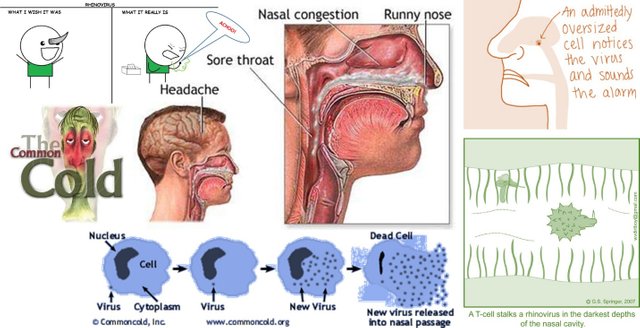The rheum virus likes our nose when it is cold!!
Hi dear steemians...
The cold is still very present in Europe at the beginning of March. Remember to cover yourself with a scarf around your neck, or even your mouth and nose, if you go out. Indeed, the rhinovirus, responsible for colds, particularly likes to be cool in the nasal cavity; it reproduces better than in the lungs where it is warmer. A study published in 2015 showed that the body's defenses were less effective at low temperatures.
Rhinoviruses are RNA viruses of the family Picornaviridae, which are transmitted by air. They are the cause of most colds and can also exacerbate asthma. Most of these rhinoviruses replicate better in cooler areas of the nasal cavity than in the lungs.
To better understand the relationship between temperature and viral replication, researchers at Yale University (USA) studied airway cells from mice infected with rhinovirus. They used cells with genetic deficiencies in the antiviral response. Their results appear in the journal Pnas.
When the mouse cells had these immune deficiencies, the virus could better replicate at 37 ° C: the immune response of the body is therefore the factor that limits the viral replication at this temperature. Researchers have also been interested in the expression of the genes involved in the immune response during a viral infection. They compared cells incubated at 37 ° C, the temperature of the body and lungs, and at cooler temperatures (33 ° C, corresponding to that of the nasal cavity). They thus found that at 37 ° C the expression of genes involved in the antiviral response was improved in the infected cells.
An antiviral response prevented at low temperatures
During a viral infection, the body produces molecules called cytokines to promote the immune response, such as interferons that can be used to recruit macrophages. In this experiment, expression levels of type I and III interferon genes and interferon-stimulated (ISG) genes were higher at 37 ° C. Therefore, this whole immune cascade is more effective at 37 ° C than at 33 ° C.
At 37 ° C, the innate immune defense against the virus limits its replication in airway cells, thanks to the secretion of interferon. For Akiko Kawasaki, one of the authors of the study, "In general, the lower the temperature, the lower the innate immune response to the virus seems to be." Temperatures influence the immune response rather than the virus itself. Therefore, it is better to keep your nose warm when it is cold, to avoid being cold!
These findings could also apply to childhood asthma. Although most people do not think a cold is serious, it can cause more severe problems for children with asthma.
Source: http://www.pnas.org/content/early/2015/01/02/1411030112
Follow me @sparganose

